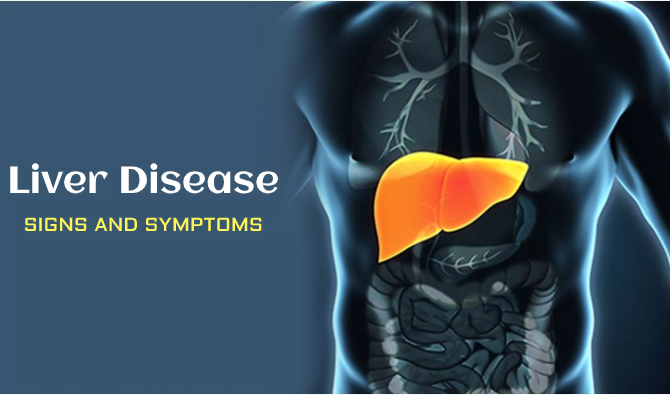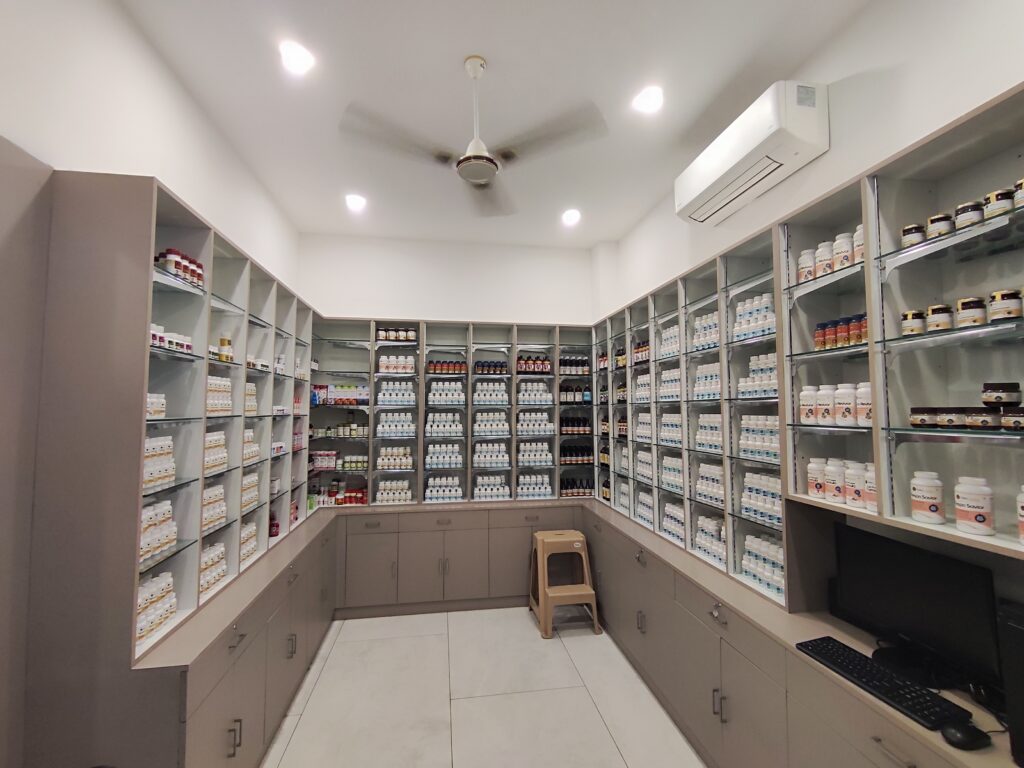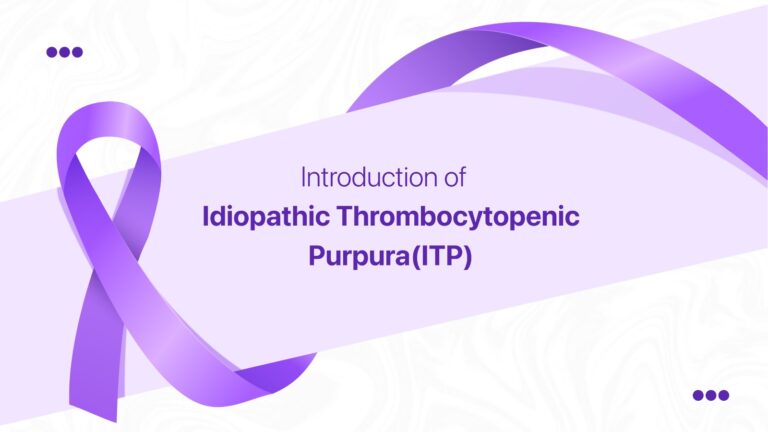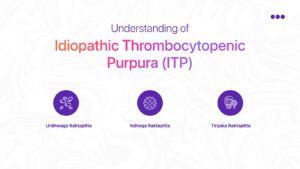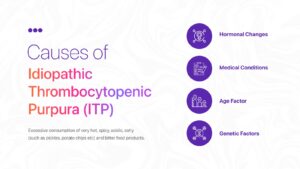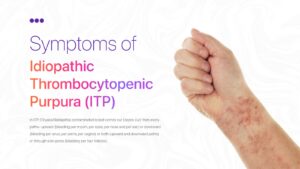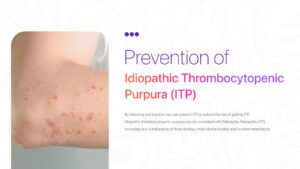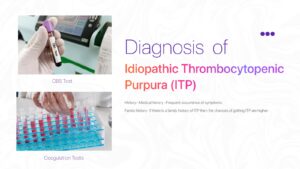INTRODUCTION OF IDIOPATHIC THROMBOCYTOPENIC PURPURA–
Idiopathic Thrombocytopenic purpura (ITP) is an autoimmune disease which is characterized by- low platelet count, due to low platelet count bleeding is excessive. Platelets help in forming blood clots, hence due to low platelet count, blood cannot clot and leading to bleeding. Idiothetic thrombocytopenic purpura also called Immune thrombocytopenia.
In Ayurveda concept haemorrhagic blood diseases are explained under the heading of Raktapitta and idiopathic thrombocytopenic purpura can be correlated with Tiryaka Raktapitta. Tiryaka Raktapitta is a type of Raktapitta.
Triyaka Raktapitta (Idiopathic Thrombocytopenic Purpura) is a Tridoshaja vayadhi (vata, pitta, kapha doshas). This disease is caused by aggravation of all three doshas, in this bleeding takes place from every paths (upward, downward or both or through skin pores) of the body.
UNDERSTANDING OF IDIOPATHIC THROMBOCYTOPENIC PURPURA-
Types of Rakta Pitta-These are three main types of raktapitta.
Urdhwaga Raktapitta-
This is caused by the aggravation of kapha and pitta. In this type contaminated blood comes out (oozes out) from the upper passage or orifices such as bleeding per mouth, nose, eyes and ears.
Adhoga Raktapitta-
This is caused by aggravation of vata and pitta. In this type contaminated blood comes out (oozes out) from the downward orifices such as bleeding per vagina, rectal bleeding and bleeding per anus.
Tiryaka Raktapitta-
This is caused by the aggravation of three dosha (vata, pitta, kapha). In this type contaminated blood comes out (oozes out) from the every paths (upward or downward or both or through skin pores of the body.
CAUSES OF IDIOPATHIC THROMBOCYTOPENIC PURPURA
Excessive consumption of very hot, spicy, acidic, salty (such as pickles, potato chips etc) and bitter food products.
By consuming foods that produce a burning sensation or acidity.
Excessive sexual intercourse and by using excessive heat.
Idiopathic thrombocytopenic purpura is caused by- mental reasons like fear, anger etc.
Consumption of incompatible food like- salty and spicy food consumption with milk.
Excessive use of radish, mustard, garlic and alcohol.
All these factors cause imbalance of pitta dosha and impairment of blood tissues which leads to (ITP) idiopathic thrombocytopenic purpura.
Idiopathic thrombocytopenic purpura is an autoimmune disorder, immune system mistakenly attacks and destroy platelets, bleeding occurs due to low platelet count.
Hormonal changes-Hormones fluctuate during pregnancy or menstrual cycle.
Medical conditions- chronic disease like lymphoma, leukaemia can increase the risk of ITP.
Age factor- ITP can occur at any age, but it is more common in young adults and children.
Genetic factors- If there is a family history then the changes of getting ITP are higher.
Other factors- ITP can be caused by stress, emotional factors and excessive alcohol consumption.
Imbalanced diet and unhealthy life style and due to not getting proper sleep.
SYMPTOMS OF IDIOPATHIC THROMBOCYTOPENIC PUPURA
In ITP (Tiryaka Raktapitta) contaminated blood comes out (oozes out) from every paths- upward (bleeding per mouth, per eyes, per nose and per ear) or downward (bleeding per anus, per penis, per vagina) or both (upward and downward paths) or through skin pores (bleeding per hair follicles).
Black spots on both legs, heavy bleeding during menstrual cycle.
Petechial hemorrhage occurs at the subcutaneous tissue (appearance of petechiae or small red spots on the skin due to bleeding under the skin).
The colour of the discharged blood is dark (blackish), greasy in touch, sticky blood and thin, foamy blood.
Following bleeding disorders are caused by-Rakta and pitta easy bruising, bleeding gums, nosebleeds and heavy bleeding during menstrual cycle due to low platelet count.
purpura- purple spots on the skin due to bleeding under the skin.
Anger issues, patient feels too hot (excessive heat) and frustration stress and anxiety due to pitta imbalance.
Due to impairment of blood tissue- weakness and fatigue.
Due to imbalance of pitta dosha- indigestion, diarrhoea or constipation.
PREVENTION OF IDIOPATHIC THROMBOCYTOPENIC PURPURA
By following some points you can prevent ITP or reduce the risk of getting ITP.
Diet- follow a balanced diet which include- fresh fruits (like apple, papaya, guava), fresh vegetables and whole grains also include- fibre rich food like oats etc and increase antioxidant intake.
Maintain healthy lifestyle and daily exercise for 30 to 40 minutes. Stay hydrated- drink plenty of water.
Avoid the stress- stress management with meditation, Pranayama, yoga and get enough sleep (7 to 8 hours per night) and reading and listening music.
Avoid pitta aggravating foods- avoid very spicy, bitter, salty, acidic food products. Avoid the consumption of incompatible food (such as salty and acidic, bitter food products with milk).
Avoid excessive physical and mental strain (because mental and physical stress contaminates vata- pitta and contaminated vata and pitta contaminate the blood and cause idiopathic thrombocytopenic purpura). Avoid environmental pollutants and toxins.
Get regular ayurvedic panchakarma treatments -because through panchakarma contaminated pitta, contaminated kapha and vata doshas are removed from body and the body gets purified. Through purgation contaminated pitta, through vomiting contaminated kapha and through vasti (medicated enema) the contaminated vata are removed from the body.
Pitta balance– pitta pacifying diet should be taken to balance pitta, such as- consume soft, cool food products.
Avoid the consumption of alcohol and smoking – because alcohol can damage bone marrow.
Avoid the excessive sugary food products- because excessive sugar alters the internal pH level making the body more acidic and increasing the risk of idiopathic thrombocytopenic purpura.
Use of iron, folic acid, turmeric (curcumin) as supplements.
Idiopathic thrombocytopenic purpura can be correlated with Raktapitta. Raktapitta (ITP) occurring due to imbalance of three doshas, (main dosha is pitta) and contaminated blood. By follow these preventive measures, doshas in the body remain balanced and by maintain doshas balance and proper digestion of food, autoimmune disorders like idiopathic thrombocytopenic purpura can be avoided.
DIAGNOSIS OF IDIOPATHIC THROMBOCYTOPENIC PUPURA-
History- Medical history -Frequent occurrence of symptoms.
Family history- If there is a family history of ITP then the chances of getting ITP are higher.
Physical examination (sharir pariksha)- check for small red spots (petechiae) on the skin or (purpura) purple spots on the skin, black spots on the both legs.
Pulse examination (nadi Pariksha)
Tongue examination (Jihva Pariksha)
Eye examination (Akshi Pariksha)
Questionnaire examination – Questions are asked about eating habits, about lifestyle and sleep etc.
Diagnostic tests- Complete blood count (CBC).
Coagulation tests.
TREATMENT OF IDIOPATHIC THROMBOCYTOPENIC PUPPURA-
Firstly manage stress with reading or listening to music, meditation, yoga, pranayama, daily exercise, follow a balanced diet and healthy life style and get proper sleep, avoid the trigger such as- anger, frustration, fear, salty, spicy and acidic food products, incompatible food products etc. Avoid the consumption of alcohol and smoking.
According to Ayurveda- detoxification (panchakarma) should be done to remove the toxins (three dosha -vata, pitta, kapha). Virechana (purgation) is the treatment for pitta dosa, Vamana(vomit) for kapha dosha, Vasti (medicated enema) for vata dosha. Panchakarma therapies- Raktamokshana procedure (bloodletting) for removal of aggravating pitta from the skin. Once the body is purified through detoxification, treatment to mitigate the doshas should be undertaken.
Herbs and Medicines- Follow a pitta pacifying diet and lifestyle.
-Vasa – best drug for management of pitta dosha.
–Ashwagandha – to boost immunity.
–Aamlaki, Guduchi, Shatavri, Nimba, papaya
-Vasa swarasa -Guduchi kwatha -Lakshadi churna
-Nimba Arka -Aamlaki churna -Ushiraadi churna
-Shatavri Churna -Pitta balance -Raktapittantaka rasa
CONCLUSION
Idiopathic thrombocytopenic purpura is a rare autoimmune disease characterised by low platelet count, Black spots on both legs, heavy bleeding during menstrual cycle, petechiae or small red spots on the skin due to bleeding under the skin, anger issues, frustration, stress anxiety etc. Caused by imbalance of Pitta dosha and Rakta dhatu vikruti (impairment of blood tissues) and Tridosha imbalance (imbalance of vata dosha, pitta dosha, kapha dosha). Healthy life style and healthy diet and enough sleep (7 to 8 hours per night) can manage the symptoms of ITP. Avoid the trigger can prevent the idiopathic thrombocytopenic purpura, if any such symptoms are found in your body then definitely contact your health care professional.


